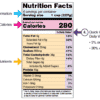Introduction

A Balanced Diet And Proper Nutrition


The Brain

Our Immune System
Our immune system must have all of the nutrients it needs so that we can fight off infection and disease. The lack of certain food groups may impair critical functions. Vitamins A and B help keep white blood cells healthy while protecting against bacteria.
Calcium promotes heart health because high calcium levels boost oxygen circulation. What we eat significantly impacts how our body feels and how that food will be digested and released. Simple carbohydrates make it easier for your digestive system to break down food.
Proteins and healthy fats provide more power than processed foods. Proteins can help prevent unnecessary snacking by providing us with energy every 3 – 4 hours! How many hours of sleep do you get each night? You may be surprised at the answer.
The average adult requires 7–9 hours per night. The human body must rest for its muscles and brain to function correctly. If we don’t get enough sleep, our bodies will suffer. It affects everything from moods to energy levels, and even cravings can become an issue.
Poor eating habits often cause stomach issues because toxins are released into the bloodstream during digestion, making sleeping difficult. Omega 3 fatty acids provide several significant benefits, such as improved memory and the ability to learn.
They also help fight against debilitating mental disorders like depression or dementia by keeping our brains healthy! So ensure you include these in your diet for clarity that will last.

Making Healthy Food Choices
Making healthy food choices is key to maintaining a healthy diet. You can follow a few simple steps to ensure you choose the best options for your body.
Step 1. Focus on eating plenty of fruits and vegetables. Fruits and vegetables are full of essential nutrients.

Healthy Fats

Balanced Diet, Proper Nutrition And Exercise
.

The Best Way To Maintain Good Health
Diet and nutrition are necessary for good health, and exercise is a crucial part of both. Maintaining good health is vital for everyone.
You can do a few key things to ensure you’re on the right track. There are many different ways to approach diet and nutrition, and what works best for one person may not work for another.
However, some general tips can help you make the best food choices for your body and health. We can improve our health by exercising regularly and maintaining an active lifestyle.
Diet and nutrition are two of the most critical aspects of our lives, and exercise plays a crucial role in both. Exercise helps to boost our metabolism and helps our bodies better utilize the nutrients we consume.
Drinking Water
Conclusion
Frequently Asked Questions
Q1. What is the importance of a balanced diet in maintaining good health?
A1. A balanced diet gives our bodies the essential nutrients, vitamins, and minerals required for proper functioning. It helps maintain overall health, supports bodily functions, and can prevent chronic diseases.
Q2. How can I ensure that I am getting a variety of foods in my diet?
A2. To ensure dietary variety, include foods from all food groups – fruits, vegetables, whole grains, lean proteins, and healthy fats. Experiment with different recipes, explore diverse cuisines and seek new ingredients to diversify your meals and maximize nutrient intake.
Q3. How important is portion control in maintaining a healthy weight?
A3. Portion control is crucial for maintaining a healthy weight. Eating appropriate portion sizes helps avoid overeating, which can lead to weight gain and related health complications. Being mindful of portion sizes and listening to your body’s hunger and fullness cues can contribute to maintaining a healthy weight.
Q4. Is drinking enough water really that important for our health?
A4. Yes it is! Staying adequately hydrated is vital for overall health and well-being. Water is crucial in digestion, nutrient absorption, regulating body temperature, and transporting waste products. Drinking at least 8 cups (64 ounces) of water per day is recommended, but individual needs may vary based on factors such as activity level, climate, and overall health.
Q5. Can you provide some tips for making healthier food choices?
Here are a few tips:
– Prioritize whole, unprocessed foods over heavily processed options.
– Include a variety of colorful fruits and vegetables in your meals.
– Opt for lean protein sources such as poultry, fish, legumes, and tofu.
– Choose brown rice, quinoa, and whole wheat bread instead of refined grains.
– Limit added sugars and opt for natural sweeteners like fruits or small amounts of honey or maple syrup.
– Be mindful of portion sizes and practice intuitive eating by listening to your body’s hunger and fullness cues.
– Cook at home more often to control ingredients and cooking methods.
– Limit your intake of saturated fats and choose healthier fats like avocados, nuts, and olive oil.
– Lastly, remember that small, sustainable changes over time can make a big difference in your overall health.
Share via:

